How Do Businesses Navigate UAE VAT Audits in 2024?

Value Added Tax (VAT) is already complex in the UAE, and with the evolving policies and regulations, it only gets more complicated. Businesses must ensure full compliance with the Dubai VAT tax system to avoid penalties. It’s crucial to understand the Dubai VAT rate, maintain proper documentation, and adopt a smart approach. So, how should businesses navigate UAE VAT audits? In this blog, we’ll explore best practices for ensuring a smooth VAT audit process, from VAT Dubai registration to maximizing the Dubai VAT refund.
What Is the VAT Tax in Dubai, and Why Is Compliance Crucial?
Understanding VAT in Dubai
Introduced at a 5% rate, VAT in Dubai requires businesses to understand how to calculate 5% VAT in UAE to avoid payment errors. The Dubai VAT rate remains 5%, and miscalculations could lead to fines.
VAT Registration Requirements
Businesses with taxable supplies exceeding AED 375,000 per year must register under VAT Dubai UAE. Failure to comply leads to significant penalties. Staying updated on VAT Dubai registration rules and maintaining thorough records is essential to avoid these fines.
VAT Refund Options
Businesses can claim a Dubai VAT refund if eligible by submitting the required documents. The process determines how much VAT refund in Dubai can be obtained, helping businesses recover expenses. Even foreign businesses and tourists can claim a Dubai VAT refund, provided they meet the specific conditions related to exports outside the UAE.
How Can a VAT Consultant in Dubai Help with VAT Audits?
What Is the Role of a VAT Consultant?
A VAT consultant Dubai plays a pivotal role in easing the audit process. They handle compliance, documentation, and tax filings on behalf of businesses. With their expertise, businesses can ensure no issues arise during audits, minimizing potential errors in tax reports.
In the case of a VAT audit, having proper documentation is critical. A qualified VAT services Dubai consultant ensures all records are correctly maintained and that the Dubai VAT tax rate is applied accurately, reducing the risk of mistakes or delays.
Audit Red Flags to Avoid
Common audit red flags include incorrect Dubai VAT tax rate applications, missed deadlines, or poor documentation. A reliable consultant helps businesses avoid these mistakes by ensuring complete and accurate financial reporting, offering protection from audit complications.
How to Prepare for a VAT Audit in Dubai?
Maintain Accurate Records
Accurate financial records are essential. Businesses must keep all invoices, tax returns, and receipts related to VAT. These documents must clearly show the Dubai VAT tax rate and the amount of VAT paid and refunded.
Accurate Calculation of VAT
Understanding how to calculate 5% VAT in UAE is critical to avoid errors in reporting. Incorrect calculations could lead to penalties and increased scrutiny from auditors.
Stay Updated on VAT Regulations
VAT regulations in Dubai can change frequently, so staying informed is vital. Businesses should work closely with their VAT consultant Dubai to stay updated on regulatory changes that could impact compliance.
Respond to Audit Notices Promptly
After receiving a VAT audit notice, businesses must respond promptly. Delaying could lead to penalties. Collect all necessary documents and ensure they accurately reflect the correct Dubai VAT tax rate.
Why Should Businesses in Dubai Focus on Proactive VAT Compliance?
Avoid Penalties
Non-compliance with VAT Dubai UAE regulations can result in hefty penalties, including fines and potential business closure for repeat offenders. By hiring a VAT consultant Dubai, businesses can ensure proactive compliance and avoid these risks.
Maintain a Good Reputation
Businesses that comply with Dubai VAT tax regulations tend to have a better reputation among investors, partners, and customers. Being compliant also helps avoid legal issues that could harm business operations.
Adapt to Regulatory Changes
Dubai’s business environment is dynamic, and VAT regulations are no different. Working with a VAT services Dubai consultant ensures businesses can stay ahead of regulatory changes and adjust their compliance strategies accordingly.
Best Practices for Navigating VAT Audits in 2024
1. Conduct Regular Internal Audits
Conducting regular internal audits prepares businesses for potential official VAT audits. This proactive step helps identify any discrepancies in records and ensures VAT is applied accurately. Internal audits also provide an opportunity to correct any inaccuracies before external auditors are involved.
2. Consult VAT Experts
Hiring a VAT consultant Dubai allows businesses to stay updated on regulatory requirements. These experts can help businesses understand the Dubai VAT rate and ensure compliance. They also assist in completing documentation and guide businesses through the audit process.
3. Maintain Clear Documentation
Clear documentation is essential for VAT audits. Businesses must ensure that all invoices, receipts, and financial reports are properly organized and indicate the correct Dubai VAT tax rate. This will facilitate a smoother audit process and reduce the likelihood of penalties.
Navigating a Dubai VAT tax audit can be challenging, but by following the right procedures, businesses can ensure compliance and avoid penalties. Staying updated on VAT Dubai UAE regulations, maintaining accurate records, and working with a VAT consultant Dubai are key to success. As 2024 approaches, businesses must be proactive in their VAT management to avoid surprises during audits. Whether calculating how much VAT refund in Dubai or preparing for an audit, proper planning and expert assistance save time and money. Don’t wait until it’s too late – take the necessary steps now for smooth VAT compliance.